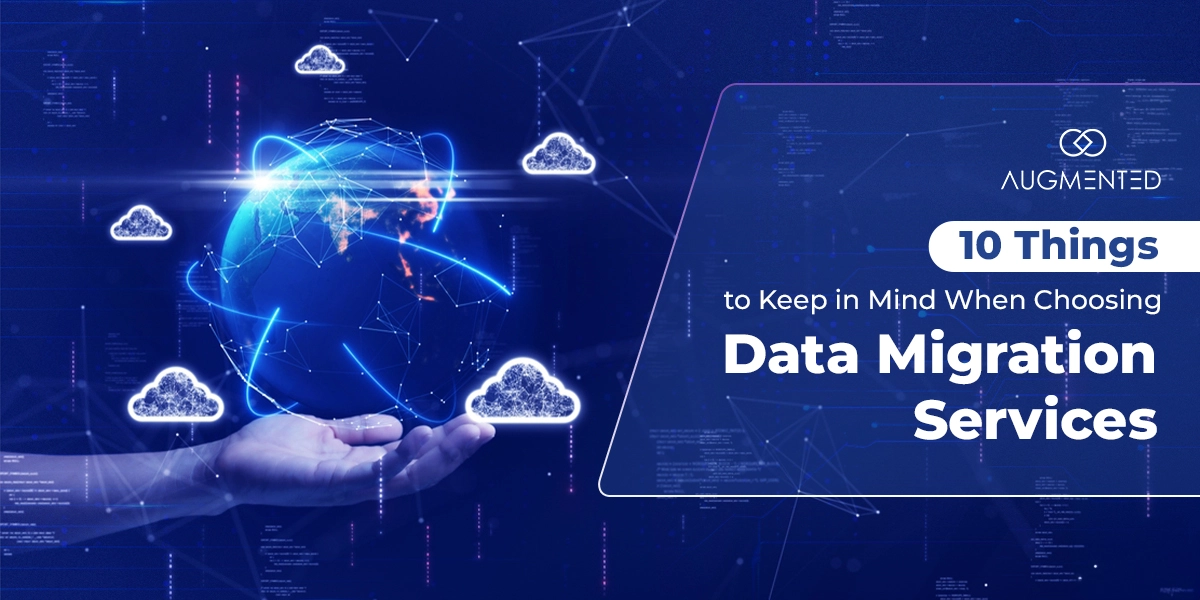Just like new homes, migrating to new systems is ‘fresh and thrilling.’ But the question is how to make the transition seamless and safe. Right?
Whether moving your belongings or migrating your data, choosing the wrong service provider can be disastrous, but it is equally crucial.
However, this headache is less tricky if you have the right ‘mover’ by your side. So, to help you pick the right partner, we have compiled a list of 10 things you must consider before choosing data migration services.
Ready for the move? Let’s go
Why Do You Need Data Migration Services?
What is Data Migration? The data migration process involves moving data from an old or legacy system to a new one. It basically consolidates all your digital data and moves it to a new and modern system.
Why do Businesses need Migration Experts?
Do you want your business to be among the 83% of migration projects that either fail or exceed their budget? Of course not!
Data is being generated rapidly, and businesses are worried about utilizing its true potential. And the best way to make the most of this data is to choose the right experts to maximize its value. But how do these migration experts make the migration process a breeze?
Data migration service providers plan, execute, and oversee your entire migration process. They ensure that your data migrates smoothly and securely while handling all the data migration challenges. The experts:
- Understand: They understand your data migration needs to provide tailored solutions
- Strategize and Plan: Develop a comprehensive migration plan while mitigating potential risks
- Audit and Improve: Audit your existing system, identify errors, and improvise wherever needed
- Cleans and Translate Data: For a seamless move, they clean and translate your data
- Perform Data Migration: They oversee the entire migration process
- Test Post-Migration: They test and test the new system to look for errors and corruption in the data
- Document: From planning and strategizing to fixing errors, they document every step
- Adhere to Regulatory Compliance: Experts ensure your migration process complies with regulatory requirements and guidelines.
So, if you are willing to save time and money while knowing that your data is in safe hands, let the experts take over. Moreover, you can manage or move your data by following the data migration best practices listed below.
Data Migration Checklist: 10 Things to Keep in Mind
Scattered, unorganized data could be one of the greatest risks businesses can take today. And the next big mistake? Moving their data from one destination or data warehouse to another without taking into account the risks associated with it.
Are you willing to take that risk or make this mistake? If not consider these 10 factors first before the big move and choosing for data migration services.
1. Your Migration Needs
Have you thought about why your business needs to migrate? No? Then, first, define your objectives. To do so, you can ask yourself the following questions.
- Migration Reason: Why are you planning to migrate?
- New System Benefit: What are the benefits of the new system or the cloud?
- Business Impact: How will it benefit your data and overall business?
- Type of Data: What types of data do you want to migrate?
- Number of Users: How many people will be using the new system?
- Migration Service: What data migration service will you opt for?
- Migration Challenges: What challenges will you face before, after and during the migration?
- Solutions: How will you overcome these challenges or risks?
- Migration Tools: What are the tools available in the market?
- Ideal Tool: Which tool is suitable for your business needs?
- Legacy System: What will happen to your legacy system?
- Data Access: Will you be able to access your data during the migration process?
- Migration Provider: Who is the data migration service provider?
Defining your needs and expectations beforehand will make your migration smooth. Data migration needs planning and proper execution. To plan, first, clarify and jot down your data migration goals.
2. Data Migration Tools and Techniques
Once you are through with your planning stage, selecting the best data migration tools or techniques is paramount.
- Step 1: Do your homework to make your migration process easy.
- Step 2: Research the tools and techniques that best suit your business needs.
- Step 3: Verify if your data migration service provider uses those tools and techniques.
Finally, consider the security of your data, cost, ease of use and other similar factors when selecting a tool or technique for data migration services. Other factors like customer support and feedback can also be considered before hiring data migration service providers.
3. Experience and Expertise
Before selecting data migration services, you shouldn’t hesitate to know your provider’s complete scope of services, expertise and experience.
No matter the amount or type of data, the data migration service should handle the data you are transferring or working with. Evaluate the data migration service providers with these questions.
- Is the data migration service provider able to process any volume of data?
- Do they have a complete data migration roadmap?
- Will they provide a comprehensive service, including pre-migration planning, execution and post-migration services?
- How long have they worked for your specific business industry?
- How do they tackle migration challenges?
- What types of tools and techniques do they have the expertise in?
Moreover, consider the scope of your migration process. If you need data cleansing and analysis services, ensure that the provider also has expertise in these areas.
4. Cost and ROI
Another important factor to consider when selecting a data migration service is the total price of the project and the return on investment (ROI). Compare pricing and ask the providers about the ROI you can expect.
Here are the two most impactful questions to consider when it comes to the overall cost of your migration process.
- What is the price of the service?
Large migration projects are typically more expensive than smaller projects. The cost also depends on the provider’s expertise, as more experienced data migration service providers charge higher fees. However, they also tend to complete complex migration projects faster than less experienced ones.
- How will the price affect the complexity of your project?
Complex data migration projects need more time, resources, and cost. But, it is crucial that the data migration service has the necessary resources for your project. Relativity simple projects will be cheaper than complex ones.
In the end, it all comes down to your requirements and budget. Lastly, assess the return on investment on the overall project.
Secret Tip: Data migration services at Augmented Systems help reduce operational costs and enhance business capabilities in the long run.
5. Downtime Management
According to a report, 76% of organizations experienced downtime and data loss in 2021. Isn’t that alarming?
Even the slightest impact on your day-to-day operations can lead to major downfalls. Therefore, choose a data migration service provider that helps maintain the continuity of your business while your data migrates.
Ask your provider the following questions for downtime management.
- What migration strategy will they follow?
- Will they move your data in phases?
- What will be the duration for the entire migration process to complete?
- Will the migration be planned during peak hours or off-peak hours?
- How will they set up real-time monitoring to detect, realize and resolve issues?
Furthermore, do not solely rely on the process or the provider. To be on the safe side, always back up your data.
6. Communication
It is essential to maintain open communication channels with both the provider and your team.
Keep your team updated about the migration process and its impact on business operations. Team members from other departments will help the migration providers understand your data and its complexity.
At the same time, communicate with the providers about the timeline and duration of the migration process. If you don’t want delays or disruptions in your business, collaborate with everyone from the very beginning.
Finally, be strategic about every stage of the move. Be open to communications and ask as many questions as you can for a seamless transition.
7. Data Security
Are you willing to lose even 1% of your data or information? Unauthorized access, breaches, and data loss should be a big no. Therefore, data service providers should understand the level of security your data needs.
To protect your data, consider these questions before choosing data migration services.
- Does the data migration service provider follow data quality standards?
- Do the data providers offer robust security measures?
- What are their data security policies?
- What is there response plan to security breaches or lost data?
- Do they comply with industry-specific standards and protocols?
Security should be number one in your data migration checklist. Breached or lost data will directly impact your business.
8. Tailored Solutions and Flexibility
You wouldn’t want to choose a provider who isn’t flexible according to your business or data needs. The right data migration services should offer tailored solutions for your data migration needs.
Seek a data migration service provider who can migrate complicated data and offer flexibility for future needs. Here are the questions to consider that should be on your data migration checklist.
- Do they offer customizable options for your specific needs?
- Can the provider handle different data types or system architectures?
- Will they be able to provide a custom migration workflow?
Do the data migration services follow the one-size-fits-all approach? If yes, avoid considering them for your data migration project, as it won’t work for most data migration projects.
9. Data Integrity and Accuracy
Data structures, storage mechanisms, and database technologies are the main differentiating factors between your legacy and the new system.
The data migration provider must maintain the integrity and accuracy of your data throughout the data migration lifecycle. It is a complex and challenging task.
Ask the provider the following questions to judge if they are suitable for a successful migration.
- How will they manage mapping data fields, system incompatibility, and data format disparities?
- How will they validate data compatibility and perform necessary transformations?
- Will they conduct data reconciliation to ensure a successful migration?
Look for a provider who makes the migration process accurate without compromising the quality and functionality of your data.
10. Scalability
Naturally, your business will scale with time, and so will your data. The data migration service you choose should also grow with your business.
The only question you ask your provider here is: Will they support your future migrations as your data and business infrastructure grow?
Conclusion
Consider improved data accuracy, reduced costs, efficiency, and better data management before signing up for a data migration service provider.
Augmented has successfully completed over 200 projects with a 95% client retention rate. Find the right partner in us. Read more to see what our clients say about our data migration services.


